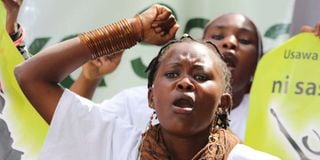Rights defenders reject draft reproductive health policy

Ms Rachael Mwikali, from Coalition for Grassroots Human Rights Defenders. Rights defenders say the health policy excludes provision for safe abortions and women were not consulted.
Grassroots human rights and women’s rights defenders took to the streets to protest the draft reproductive health policy (2022-2030) set to be launched tomorrow.
They said women were not consulted and that the policy excludes provision for safe abortions.
The draft policy, they said, also uses stigmatising language against adolescents, survivors of sexual violence and people outside the traditional family unit.
The activists, carrying posters with words such as “we reject the draft policy”, started their protest at the Jeevanjee gardens and made their way to the offices of the Ministry of Health to submit a written petition.
“The development process was not public, and the policy was not readily accessible online. How can the policy speak to the needs of all Kenyans when the most vulnerable and marginalised have not been given a chance to participate?” said Rachael Mwikali, from Coalition for Grassroots Human Rights Defenders.
Ms Mwikali lamented that the Environment ministry’s failure to include safe abortions – even though unsafe abortions are some of the main causes of maternal mortality in Kenya – was dangerous and unconstitutional.
“The Constitution notes that pregnant women can seek safe abortion if, in the opinion of a trained health professional, there is a need for emergency treatment, or the life or health of the mother is in danger,” she said.
“Without guidance from the ministry, women who use public health facilities are unable to seek safe abortions due to a lack of information and services.”
She added: “The language in the policy stigmatises young survivors of sexual violence by blaming them for refusing to resist forced sex from partners.
“It stigmatises the sexual and reproductive health rights (SRHR) of adolescents by emphasising abstinence and delayed sexual debut as their main SRHR needs. What about teen mothers who have been defiled?”
The Health ministry, the activists said, should suspend the scheduled launch of the policy, engage the public and grassroots communities about their needs and then review it before it is passed into law.
“Last year, President Uhuru Kenyatta said at the Generation Equality Forum that Kenya supports feminist leadership. Is this what it is about? Criminalising women’s bodies?” she asked.
“It is also ironic that we signed the Geneva Convention which criminalises access to safe abortion. If you get raped, you cannot access safe abortion. Our women and girls are dying in the slums because of unsafe abortions. We want Kenya to withdraw from the convention, just like the US did.”
Ruth Mumbi also lamented what she referred to as men making decisions involving the bodies of women without consulting them.
“These are our lives, and they concern the future of girls. We demand a seat at the table where policies regarding our bodies are made so that our voice is heard. It is our constitutional right to be represented. We don’t recognise this policy, therefore it must not pass,” she said.
Marylize Biubwa, a human rights defender and activist, said the ministry needs to urgently publicise the policy, provide forums for public participation and include all critical sexual and reproductive health needs in the policy, in line with achieving the highest attainable standards for human health.
The Health ministry, she emphasised, also needs to recognise the rights and needs of people with disabilities, the queer community, and gender non-conforming persons.
“We are here to say we need the policy to be stopped because there are many things that can be changed for the better to enable access to sexual and reproductive health to become much easier and humanising for Kenyan women, children, girls and gender minorities,” she said.
“From the time someone recognises their identity as a woman, they should be able to have 100 per cent responsibility and autonomy to make decisions over that body.”
She added: “Providing access to safe abortion gives women a right to decide when to have a child, which is a powerful decision for survivors of sexual violence.”
If the launch proceeds, she explained, the activists will go to court to try to block its adoption.
On his technical note in the draft policy, Dr Patrick Amoth, the Health director-general, said the policy is founded on improving responsiveness to women’s reproductive health needs.





